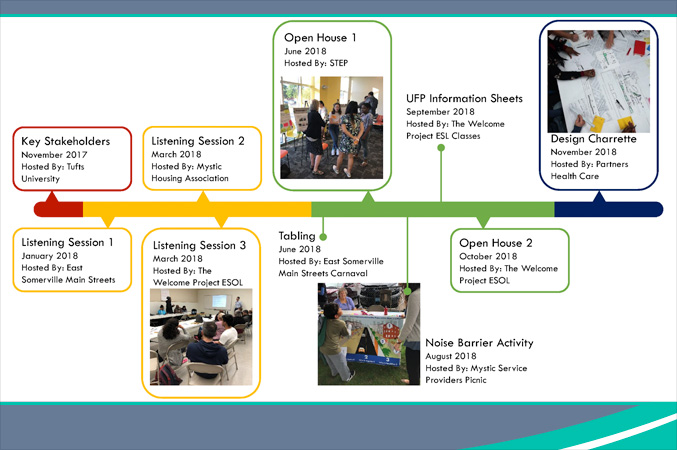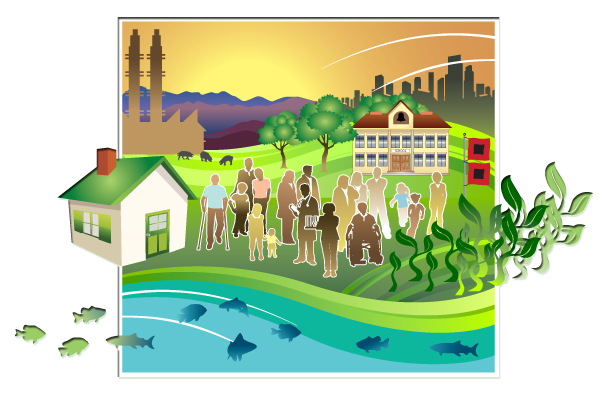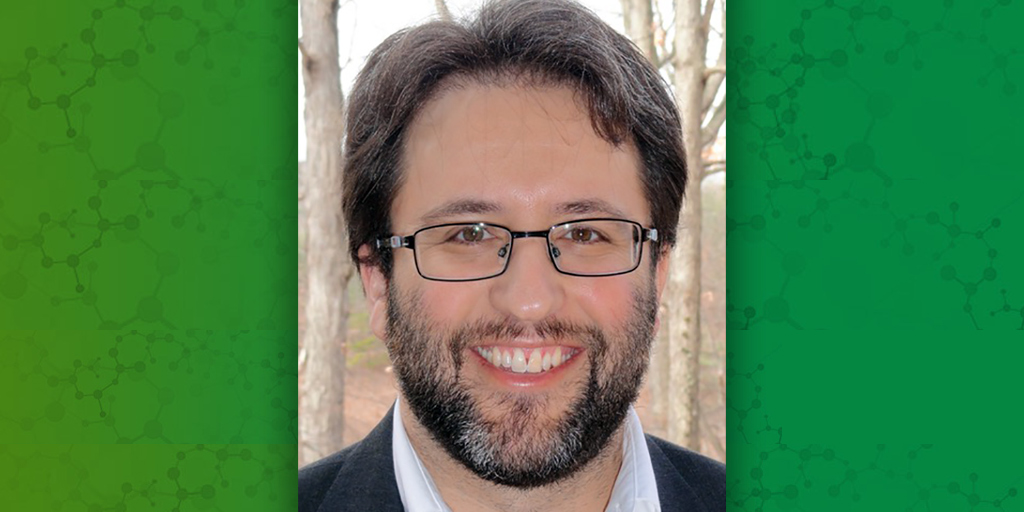Academic-Community Partnership Informs Policy and Practice to Reduce Air Pollution Exposure
Community outreach and engagement are key components of translating research into action. One academic-community partnership that was created to address the health effects of traffic-related air pollution has had significant impacts on community development projects since its initiation in 2008. It has improved indoor air filtration in building design and supported development of policies to lessen resident exposure to traffic-related air pollution.
The partnership, the Community Assessment of Freeway Exposure and Health Study (CAFEH), initially funded by a National Institute of Environmental Health Sciences grant, studied air pollutants and cardiovascular disease risk among residents in Boston’s Chinatown and neighboring Somerville, two environmental justice communities with high levels of traffic-related air pollution. CAFEH now serves as an umbrella for multiple community-based participatory and community engaged research studies focused on air pollution and provides policy advice to various stakeholders. Three recent papers describe how the partnership provides a promising strategy to translate research into practice, the strategies used to engage community stakeholders, and how negative health effects of traffic-related air pollution were mitigated.
“This research started with a request from the community to assess the risk of air pollution from the highway,” said Doug Brugge, Ph.D., a researcher at the University of Connecticut, chair of the Department of Public Health Sciences, and principal investigator on the NIEHS grants that supported this work. “Having a participatory community partnership helped lead us from studying the problem to investigating ways to reduce exposure and the associated health risks. Consequently, much of our work today is on indoor air filtration, noise barriers, and urban planning and building design.”
Effective Community Engagement Gets Research Translated Into Action
Since CAFEH research findings have had a positive impact on a variety of community projects, Brugge and collaborators at multiple universities, community partners, and agencies were interested in determining which specific components led to the successful translation of research into action. To learn about community-level factors, the team conducted interviews, observations, and document review from 2017 to 2018.

Timeline of community engagement activities including listening sessions, participatory design sessions, and community events. (Photo courtesy of Doug Brugge, Ph.D.)
“No surprise, we have learned that working with community partners is the key to research translation. Our partners have a nuanced understanding of the local landscape, including political dynamics, resident priorities, and developer concerns. Working together we have been able to get the research findings to the right people in a meaningful way,” noted Linda Sprague Martinez, Ph.D., a researcher from Boston University School of Social Work.
One of CAFEH’s partners, the Somerville Transportation Equity Partnerships, is an organization of community advocates for transportation improvements in Somerville. They have worked with local and state elected officials and city staff to develop solutions to their concerns.
Ellin Reisner, Ph.D., president of the Somerville Transportation Equity Partnerships, explained, “We use a number of approaches to reduce exposure to traffic related air pollution, from testifying at local Planning Board meetings on new housing projects, to working with local and regional environmental justice groups to increase public awareness of the health impacts of traffic related air pollution. Our work also focuses on improving indoor air quality standards. This involves holding community meetings on our research findings to inform residents and collaborate with them to seek solutions that reduce air pollution exposure.”
Effective community engagement has led to CAFEH’s successes in translating research findings into action in Somerville and Chinatown. The Metropolitan Area Planning Council, one of CAFEH’s partner organizations, led a health lens analysis. Health lens analysis is an iterative, data driven process that facilitates collaboration between community members and government stakeholders and focuses on generating health-based recommendations.
Sharon Ron, of the Metropolitan Area Planning Council said, “The ultimate goal of this work is to see that the ideas and recommendations generated by these reports informs city or state action. We continue to work with stakeholders around the region to raise awareness of this issue and promote evidence-based solutions.”
In Somerville, residents identified air quality and noise pollution as top concerns. Through participatory design sessions, a hallmark of health lens analysis, residents worked with multi-disciplinary stakeholders such as environmental engineers and city planners to develop designs for noise barriers to mitigate both noise and air pollution exposure. CAFEH determined that current Department of Transportation guidelines did not prioritize noise barriers in Somerville, so community action focused on advocating for policy change to prioritize noise barrier construction.

A Somerville neighborhood bordering the highway (left image) is a good candidate for a noise barrier to mitigate traffic-related noise pollution (right image). (Photo courtesy of Doug Brugge, Ph.D.)
In Chinatown, resident priorities were collected through a series of community meetings that included residents and community leaders. These data informed participatory design sessions in which community members focused on green space, improved pedestrian safety, and ways to prevent commercial and residential displacement. As a result of community involvement, air pollution mitigation efforts have been included in Chinatown’s neighborhood master plan and in its strategies for future community development.
Lydia Lowe, Executive Director of the Chinatown Community Land Trust stated, “In the beginning, the community was not that tuned into research. But over the years, CAFEH's research findings have become popularized, and our community has used that work to envision and demand a stable and healthy Chinatown.”
The Partnership’s Impact on Community Practices
As a result of its sustained presence in the community in decision-making, CAFEH has become a trusted resource within the Somerville and Chinatown communities. It has found itself in a consultative role, which has led to the consideration of air pollution concerns in construction and city planning projects.
“I’ve been interviewing individuals involved in planning from across sectors in each of the communities, and it has been interesting to hear about the different ways in which the CAFEH research has informed local practice; from specific development projects to community sustainability planning, and people are talking about air pollution,” said Sprague Martinez.
Researchers found that CAFEH’s knowledge about air pollution’s effects on human health informed how construction and community planning projects were completed. For example, developers have incorporated mitigation measures, such as high-efficiency air filters, to lessen the health effects of near-roadway air pollution. Municipal and state policies, including pending legislation that would require mitigation in new near-roadway schools and homes, were also influenced by CAFEH research findings.
“Our iterative, health lens analysis-facilitated stakeholder engagement brought the community’s concerns to the attention of government officials,” said Brugge. “Our latest research is a trial of portable air filters in homes near the highway in Somerville. The American Heart Association, NIEHS, and others have recently called for trials of this sort to evaluate their efficacy. I feel that our community partnership pushed us to be ahead of the curve on this issue.”
Environmental Health Perspectives Journal Updates Environmental Racism Collection
The journal Environmental Health Perspectives recently released Environmental Racism Collection 2021: Exposure and Health Inequities in Black Americans. The journal’s inaugural environmental racism collection was published in 2020, and with the updated release, the journal is rededicating itself to the topic and continuing the ongoing conversation about racism and environmental health. The 2021 collection includes new articles on subjects such as the relationship between redlining and greenspace, and approaches to studying the exposome in the context of racial health equity. Overall, the collection’s papers report on both the downstream effects of systemic racism and how to measure and study racism directly. Although the collection focuses on issues facing Black Americans, the journal invites authors to submit papers on all populations that have been affected by environmental racism. Additionally, after reflecting on how the journal can combat environmental racism, the editors have specified requirements for authors on how to appropriately incorporate race and ethnicity in study design and reporting. Editor-in-Chief Joel Kaufman and guest editorialist Anjum Hajat discuss these requirements in Confronting Environmental Racism.
The Journal of Exposure Science & Environmental Epidemiology Releases Environmental Health Equity Special Issue
The Journal of Exposure Science & Environmental Epidemiology recently released a special issue, Advancing Environmental Health Equity. This issue addresses the inequitable distribution of disease burden arising from environmental and other social factors. The issue includes published works of studies which move the needle forward for action on environmental health equity, including an examination of how air pollution and socioeconomic factors influence preterm births, a characterization of metal mixture exposure among children living near an industrial area, and measurement of pesticide exposure among Latina agricultural workers. The featured research includes interdisciplinary partnerships, community engagement, and analyses that get to the root of health inequities. Environmental health equity and research frameworks needed to advance this work are discussed in an editorial, Environmental Health Equity: Moving Toward a Solution-Oriented Research Agenda.
NIEHS Launches Environmental Health Language Collaborative
NIEHS’ new Environmental Health Language Collaborative aims to harmonize language used to describe environmental health science research. Describing data consistently across the field is critical to the goal of NIEHS’ Strategic Plan of translating research results into a collective body of knowledge that informs and supports public health action. The Collaborative seeks diverse representation of expertise, needs, and scientific interests. Its 2021 goals are to define itself and to get stakeholders to begin working together. Working teams have already drafted the community name, mission, goals; structure; and use cases. Community members are welcome to review the proposals and provide input, which will form the basis of the community discussion at a virtual workshop to be held in September.
Frontiers in Communication Journal Shows How Communication Affects Public Perception of Health and Science
The open access journal, Frontiers in Communication, publishes peer-reviewed research on how communications systems and communication define people’s understanding of the world. The journal covers a variety of topics related to environmental public health such as disaster communications, health communication, and science and environmental communication. Manuscript submissions for various topic areas, including Digital Narrative and Interactive Storytelling for Public Engagement with Health and Science, are being accepted. Other topics of interest to the PEPH community are Inclusive Science Communication in Theory and Practice, Understanding the Role of Online Video-Sharing for Science and Research Communication, and Resilience in the Face of Environmental Disasters in the Age of COVID-19. The journal fosters cross-disciplinary research in communications and was one of the first social-science journals in the “Frontiers in” series.
NIEHS to Host Listening Sessions to Address Funding Inequities to Underrepresented Groups and Institutions
The NIEHS Division of Extramural Research and Training will host listening sessions for researchers and research staff at Historically Black Colleges and Universities and Minority Serving Institutions. Through these sessions, NIEHS will gather input on strategies to begin to address inequities around funding, both to academic institutions with diverse student populations and to underrepresented groups in the environmental health science research community. These groups include Blacks and African Americans, Native Americans/Alaska Natives, Latinos, and researchers with physical disabilities. NIEHS wants to hear about researcher and staff experiences in applying for NIEHS funding, including challenges and what has gone well; what has kept people from applying for funding; challenges associated with finding training programs for students; what resources and mechanisms would be useful to maintain or build research capacity at all minority serving institutions; and whether there are environmental health research topics that participants are working on that are not currently reflected in the NIEHS portfolio. Registration is now available for each of the four listening sessions: July 19, July 26, August 16, and August 18. NIEHS leadership will be present only for the welcome for the first two sessions and for the entirety of the last two sessions.

PEPH Environmental Health Chat Podcast Series
Hair Care and Black Women’s Health
PEPH Environmental Health Chat Podcast Series
Hair Care and Black Women’s Health
You can find more podcasts on the Environmental Health Chat webpage or subscribe to the series on iTunes. We want your feedback! Send comments and ideas for future podcasts to [email protected].

PEPH Grantee Highlight
Mary Turyk, Ph.D.
Mary Turyk, Ph.D., studies seafood dietary habits to improve public health. Mercury and other harmful contaminants found in seafood can cause health problems such as neurodevelopmental and reproductive disorders. Turyk, the co-director of the Integrative Health Science Facility Core at the NIEHS-funded ChicAgo Center for Health and the EnvironmenT, hopes to minimize harmful exposures from contaminated seafood by using targeted interventions. She and Susan Buchanan, M.D., led the Fish Intervention Study for Health project, which promotes healthy seafood choices among Chinese, Korean, and Vietnamese populations in Chicago. Turyk and her colleagues worked with community-based organizations to understand dietary practices among diverse Asian populations in Chicago and to enroll participants in the study. Using information gathered from the study’s surveys and focus groups, the team then created tailored, culturally appropriate health messaging and, with their community partners, disseminated findings throughout the Asian communities in Chicago. Although the study is wrapping up, Turyk hopes the resources created through the study will continue to be helpful, so the study website will remain active.
Funding Opportunites
Emergency Award: RADx-UP - Social, Ethical, and Behavioral Implications (SEBI) Research on Disparities in COVID-19 Testing Among Underserved and Vulnerable Populations (U01 Clinical Trials Optional)
Uses an emergency U01 mechanism to support the Rapid Acceleration of Diagnostics-Radical (RADxSM-UP) initiative. Research proposed in response to this FOA should address social, ethical, behavioral, structural, environmental, historical and policy factors, including structural racism within public health and health care delivery systems, that lead to disparities in access to and uptake of COVID-19 testing in underserved and/or vulnerable populations. SEBI applications are not required to conduct or administer COVID-19 testing and should not propose the actual administration COVID-19 testing or vaccination as the primary activity or aim.
Deadline: July 7, 2021
Emergency Awards: Community-engaged COVID-19 Testing Interventions Among Underserved and Vulnerable Populations – RADx-UP Phase II (U01 Clinical Trial Optional)
Provides an expedited funding mechanism to support Phase II of the Rapid Acceleration of Diagnostics – Underserved Populations (RADxSM-UP) initiative. These two-year Testing Research Projects will (1) expand the scope and reach of RADxSM-UP testing interventions to reduce COVID-19 disparities among underserved and vulnerable populations and (2) address scientific questions on interventions to increase access and uptake of COVID-19 testing given the increasing availability of SARS-CoV-2 vaccines. Phase II projects will apply scientific knowledge gained in 2020 and 2021 to develop and evaluate interventions with the goal of conducting testing to decrease disparities that contribute to the increased risk of COVID-19 infections, hospitalizations, and mortality. Projects will help to understand and address disparities in testing and the effects of testing combined with other mitigation strategies on infection rates, transmission, and outcomes. Applicants are encouraged to develop research or engagement partnerships with the Community Engagement Alliance (CEAL) Against COVID-19 Disparities initiative, where geographically appropriate.
Deadline: July 7, 2021
Hubs of Interdisciplinary Research and Training in Global Environmental and Occupational Health – Research (Collaborative U01 Clinical Trial Optional)
Solicits applications for research projects in linked Hubs of Interdisciplinary Research and Training in Global Environmental and Occupational Health (GEOHealth). This collaborative award supports research at an institution in a Low- or Middle-Income Country (LMIC), while this FOA (Hubs of Interdisciplinary Research and Training in GEOHealth – Research Training (Collaborative U2R Clinical Trial Optional)) supports research training at a U.S. institution. Applications submitted in response to both FOAs must demonstrate extensive coordination between these two awards. The overall objective of the GEOHealth program is to support the development of institutions in LMICs that will serve as regional hubs for collaborative research, data management, research training, curricula and outreach material development, and policy support around high priority local, national, and regional environmental and occupational health threats. NIEHS is interested in supporting research and research training in LMICs that address or seek to understand how exposures to toxic environmental insults alter biologic processes, are linked to disease initiation, progression or morbidity, and activities that lead to the development of prevention and intervention strategies to reduce environmentally induced diseases. Topics and disease outcomes of particular interest include airway diseases, cardiovascular disease and neurological disorders, children’s environmental health and the unique vulnerability of developing children to harmful environmental exposures including outcomes such as low birth weight or premature birth, climate change and human health, and research exploring exposures during early life stages or critical windows of susceptibility that may directly or indirectly affect the risk of developing disease. NIEHS supports research examining health consequences due to the interplay between environmental exposures and cofactors such as infectious agents or social factors that contribute to environmental health disparities.
Deadline: July 8, 2021
Letter of Intent: Due 30 days prior to the application due date
NIH Countermeasures Against Chemical Threats (CounterACT) Early-stage Investigator Research Award (R21 Clinical Trial Not Allowed)
Recruits Early Stage Investigators to pursue research programs of interest to the NIH Chemical Countermeasures Research Program under the NIH CounterACT grant/cooperative agreement program. Projects may be exploratory, applied, proof of principle, or high risk-high impact research to discover safe and effective therapeutics to mitigate toxicities resulting from exposures to highly toxic chemicals. No preliminary data are required, expected, or encouraged. However, if available, minimal preliminary data are allowed. All preliminary data should be clearly marked and limited to one-half page, which may include one figure. Projects will have an extended level of support (3 years) and are expected to generate preliminary data that would facilitate the development of competitive applications for more extensive funding support from the NIH CounterACT programs or other related initiatives.
Deadline: July 27, 2021
Letter of Intent: June 27, 2021
SBIR E-Learning for HAZMAT and Emergency Response (R43/R44 Clinical Trial Not Allowed)
Encourages Small Business Innovation Research (SBIR) grant applications from small business concerns that propose to further the development of Advanced Technology Training (ATT) products for the health and safety training of hazardous materials (HAZMAT) workers; waste treatment personnel; skilled support personnel associated with an emergency/disaster; emergency responders in biosafety response, infectious disease training and cleanup; emergency responders in disasters and resiliency training; and for ATT tools to assist in responding to environmental disasters. The major objective of the NIEHS Worker Training Program (WTP) is to prevent work related harm by assisting in the training of workers in how best to protect themselves and their communities from exposure to hazardous materials. NIEHS encourages applicants to review the SBIR E-Learning for HAZMAT Program, to pursue partnerships and collaboration with awardees of the WTP program, and to design new technology-enhanced training methods or e-Learning products that can enhance the existing NIEHS supported curricula and training programs while adhering to the Minimum Health and Safety Training Criteria: Guidance for Hazardous Waste Operations and Emergency Response (HAZWOPER) and HAZWOPER-Supporting Training.
Deadline: July 30, 2021
Letter of Intent: June 30, 2021
Understanding and Addressing the Impact of Structural Racism and Discrimination on Minority Health and Health Disparities (R01 Clinical Trial Optional)
This initiative will support (1) observational research to understand the role of structural racism and discrimination in causing and sustaining health disparities, and (2) intervention research that addresses structural racism and discrimination in order to improve minority health or reduce health disparities. NIEHS is interested in observational research examining the role of structural racism and discrimination as a significant determinant in environmental health disparities, or evidence-based intervention research that mitigates or prevents the negative health outcomes attributable to environmental structural racism and discrimination. Applicants are strongly encouraged to utilize community engaged research approaches and include letters of support from community partners. Applications that demonstrate collaborative (i.e., community-academic partnerships) approaches to understand and/or address the negative health effects of environmental structural racism and discrimination across multiple health disparity communities will be prioritized. Areas of specific interest to NIEHS include, but are not limited to: single or combined environmental exposures affecting the health of communities; health impacts of climate change, extreme weather and natural or human caused disasters; the built environment and greenspace, including green gentrification; studies grounded in community identified concerns around the intersection of environmental structural racism and discrimination and health outcomes; the impact of environmental structural racism and discrimination on health outcomes across the lifespan; and the role of environmental structural racism and discrimination in occupational exposures.
Deadline: August 24, 2021
Letter of Intent Deadline: July 20, 2021
Support for Research Excellence – First Independent Research Award (R16 Clinical Trial Not Allowed)
The purpose of the Support for Research Excellence – First Independent Research (SuRE-First) awards is to support research grants for faculty investigators who have not had prior independent external research grants. A SuRE-First applicant must identify a scientist based in the U.S. with expertise and an extramural funding record in the proposed field of research to serve as a mentor. SuRE-First-supported projects must have student participation in the execution, analysis, and reporting of the research. Awards are open to institutions that receive no more than $6 million per year from NIH Research Project Grants and additionally enroll at least 25% of undergraduate students supported by Pell grants, or are an accredited medical/health professional school with a historical mission statement that explicitly states that it was founded to educate students from nationally underrepresented backgrounds.
Deadlines: September 28, 2021; September 28, 2022; September 28, 2023
Addressing Health Disparities Among Immigrant Populations Through Effective Interventions (R01 Clinical Trial Optional)
Supports research to design and implement effective interventions to enhance health advantages and reduce the health disparities among U.S. immigrant populations, particularly migrant workers, recent and first-generation immigrants. This announcement calls for multidisciplinary/multilevel research focusing on the design and implementation of effective interventions that will address immigrant-specific factors to reduce health disparities. A framework to demonstrate the multidomain, multilevel factors that may influence health disparities is available here. A life-course perspective is encouraged with interventions focusing attention on transition points across the lifespan and associated risk and protective factors for immigrant populations. Projects should involve collaborations among relevant stakeholders in U.S. immigrant population groups, such as researchers, community organizations, healthcare providers, public health organizations, consumer advocacy groups, and faith-based organizations. Projects must focus on immigrants from one or more NIH-designated populations that experience health disparities in the U.S., which include racial and ethnic minorities (Blacks or African Americans, Hispanics/Latinos, Asian Americans, and Pacific Islanders).
Deadlines: February 5, 2021; June 5, 2021; October 5, 2021
Addressing the Etiology of Health Disparities and Health Advantages Among Immigrant Populations (R01 Clinical Trial Not Allowed)
Supports innovative research to understand factors uniquely associated with the immigration experience that contribute to health disparities or health advantages among U.S. immigrant populations, particularly migrant workers, recent and first-generation immigrants. This announcement calls for multidisciplinary research to address the specific underlying causes and mechanisms of health disparities and health advantages. A framework to demonstrate the multidomain, multilevel factors that may influence health disparities is available here. Projects should involve collaborations among relevant stakeholders in U.S. immigrant population groups, such as researchers, community leaders and organizations, public health organizations, consumer advocacy groups, faith-based organizations, and healthcare providers. Projects must focus on immigrants from one or more NIH-designated populations that experience health disparities in the U.S., which include racial and ethnic minorities (Blacks or African Americans, Hispanics/Latinos, Asian Americans, and Pacific Islanders).
Deadlines: February 5, 2021; June 5, 2021; October 5, 2021
Dissemination and Implementation Research in Health (R01 Clinical Trial Optional)
Supports innovative approaches to identifying, understanding, and developing strategies for overcoming barriers to the adoption, adaptation, integration, scale-up and sustainability of evidence-based interventions, tools, policies, and guidelines. Additionally, there is a benefit in understanding circumstances that create a need to stop or reduce (“de-implement”) the use of interventions that are ineffective, unproven, low-value, or harmful. This FOA invites research grant applications that will identify, develop, test, evaluate, and/or refine strategies to disseminate and implement evidence-based practices (e.g. behavioral interventions; prevention, early detection, diagnostic, treatment and disease management interventions; quality improvement programs) into public health, clinical practice, and community (e.g., workplace, school, place of worship) settings. Studies to advance dissemination and implementation research methods and measures are also encouraged.
Deadlines: February 5, 2021; June 5, 2021; October 5, 2021
Letter of Intent: Due 30 days prior to the application due date
Transition to Independent Environmental Health Research Career Award (K01 Independent Basic Experimental Studies with Humans Required)
The Transition to Independent Environmental Health Research career award is a 3-year bridge scholar development program for newly independent faculty who intend to pursue research careers in environmental health sciences. This funding opportunity is designed for applicants proposing to serve as the lead investigator of an independent clinical trial, a clinical trial feasibility study, or a separate ancillary study to an existing trial. For applicants not planning independent basic experimental studies with humans, there are two companion funding opportunities. Applicants planning independent clinical trials with specific application toward processes or with products in mind, must apply to the companion funding opportunity announcement, Transition to Independent Environmental Health Research Career Award (K01 Clinical Trial Required). Applicants not planning an independent clinical trial, or proposing to gain research experience in a clinical trial led by another investigator, must apply to companion funding opportunity announcement, Transition to Independent Environmental Health Research Career Award (K01 Clinical Trial Not Allowed). At the conclusion of the career development period the candidates are expected to demonstrate they can successfully compete for research funding in the environmental health sciences. Eligible candidates for the K01 award must have a research or health-professional doctoral degree and must be within three years of their appointment to their first independent faculty position at the time of submission (receipt date) of the application.
Deadline: October 12, 2021
Research on Autism Spectrum Disorders (R01 Clinical Trial Optional)
This award supports research designed to elucidate the etiology, epidemiology, diagnosis, and optimal means of service delivery in relation to Autism Spectrum Disorders (ASD). The Research Project Grant (R01) mechanism supports discrete, specified projects based in scientific areas that represent the investigators’ specific interests and competencies, and that fall within the mission of the participating NIH Institutes and Centers. Additional companion funding opportunities are available for a Small Research Grant (R03) which supports small, discrete, well-defined projects that can be completed in two years and that require limited resources (Research on Autism Spectrum Disorders (R03 Clinical Trial Optional)); and an Exploratory/Developmental Grant (R21) which encourages exploratory/developmental research by providing support for the early and conceptual stages of project development (Research on Autism Spectrum Disorders (R21 Clinical Trial Optional)). Basic research into the pathophysiology of ASD, including research on brain mechanisms, is of special interest. Also, of high priority are clinical and applied investigations that may lead to the development of new treatments and interventions.
Deadlines: June 16, 2021; October 16, 2021
NIH Blueprint and BRAIN Initiative Diversity Specialized Predoctoral to Postdoctoral Advancement in Neuroscience (D-SPAN) Award (F99/K00 Clinical Trial Not Allowed)
The NIH Blueprint and Brain Research through Advancing Innovative Neurotechnologies (BRAIN) Initiative Diversity Specialized Predoctoral to Postdoctoral Advancement in Neuroscience (D-SPAN) Award is intended for individuals who have demonstrated an interest in a neuroscience research career in NIH Blueprint mission-relevant areas and/or BRAIN Initiative research areas. This award will support a defined pathway across career stages for outstanding graduate students from diverse backgrounds, including those from groups underrepresented in biomedical and behavioral sciences. This two-phase award will facilitate completion of the doctoral dissertation and transition of talented graduate students to strong neuroscience research postdoctoral positions and will provide career development opportunities relevant to their long-term career goal of becoming independent neuroscience researchers.
Deadlines: December 15, 2021; April 15, 2022; December 15, 2022; April 14, 2023; December 15, 2023
Letter of Intent: Due 30 days prior to application due date
Notice of Intent to Publish a Funding Opportunity Announcement for Virtual Consortium for Translational/Transdisciplinary Environmental Research (ViCTER) (R01 Clinical Trial Optional)
Intent to reissue a funding opportunity announcement for the ViCTER award. The ViCTER program fosters and promotes early-stage transdisciplinary collaborations and/or translational research efforts among fundamental (technology and mechanism oriented), clinical (patient-oriented), and population-based researchers in the environmental health field. This funding opportunity will use the R01 mechanism and will bring together newly established collaborative teams to investigate potential linkages between human health and one or more environmental stressor(s). The ViCTER program is intended to support innovative high-risk, high-reward cross-disciplinary and/or translational research projects that are more difficult to achieve in a typical R01 application. Collaboration among investigators at different institutions through a virtual consortium arrangement are highly encouraged.
Deadline: February 1, 2022










